The political tides of war are shifting — and may be taking Ukraine with them
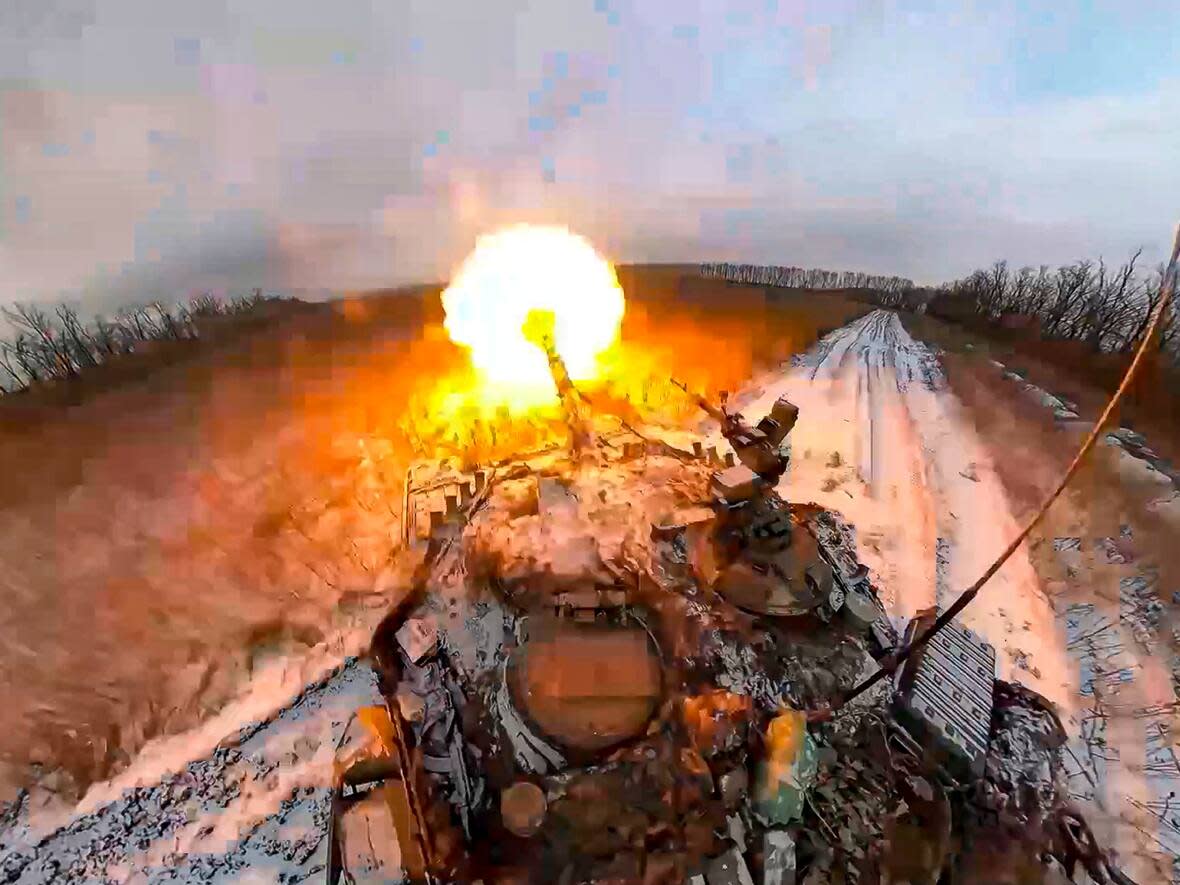
We have been warned — over and over again lately — that Russia's invasion of Ukraine is an inflection point in history.
And while the soaring political rhetoric may have sounded good over the last few years, it's very likely that this week — after a cascade of events in Kyiv, Moscow, Washington and, yes, even Ottawa — we truly arrived at that turning point.
We just might not like where it's going.
Following the British victory in the war-scorched wasteland of El-Alamein in western Egypt in early November 1942 (and the concurrent U.S.-led invasion of North Africa), Winston Churchill stood before an audience at London's Mansion House for the Lord Mayor's Day Luncheon.
It was a watershed moment in a war that, up to that point, had been going very badly for western democracies and the Soviet Union — something we tend to forget in the haze of Second World War nostalgia and self-congratulation.
Churchill, the wartime leader to whom Ukrainian President Volodymyr Zelenskyy is often compared, recognized El-Alamein as an inflection point.
"Now this is not the end. It is not even the beginning of the end. But it is, perhaps, the end of the beginning," he told his audience.
There may be no better way of describing where we find ourselves today.
As it turned out, Churchill was right. There were still a number of major inflection points to follow — the Battle of Stalingrad and D-Day among them. But the tide had definitely turned.
It's hard to walk away from the events of this week without the same vague sense that something critical has changed.
There's been a lot to take stock of: Zelenskyy firing his top military commander, the spectacular crash of the bundled U.S. military aid package, the solidifying gridlock in the U.S. Congress, public opinion polling in Canada that shows a growing number of Conservatives believe Ukraine is getting too much aid — and finally the propaganda tour de force of former Fox News host Tucker Carlson's interview with a rambling Russian President Vladimir Putin.
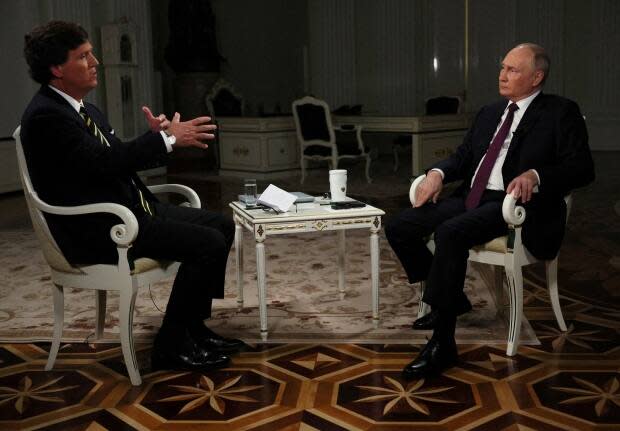
"We're at an inflection point," said Dominique Arel, chair of Ukrainian studies at the University of Ottawa. "But I would say the inflection is taking place in [the U.S.] Congress."
The replacement of long-serving Ukrainian top commander Gen. Valerii Zaluzhnyi with the older, Soviet-trained Colonel-General Oleksandr Syrskyi is significant, said Arel, but it pales in comparison with the political machinations in Washington. He said "it's hard to see a way out" of the political stalemate in Washington as the U.S. leaves the impression it's on the verge of abandoning Ukraine.
The unblocking of 50 billion euros ($54 billion US) in European Union aid was a bright spot — one which Arel said signals that even though we're at a turning point, it doesn't mean we're headed toward catastrophe in the war in Ukraine.
"We're headed toward months ... a whole year of uncertainty, and greater, greater suffering," he said.
"Not talking about the likelihood of a complete collapse of the front. No, I don't think so. But the stepped-up bombing of cities is a concern."
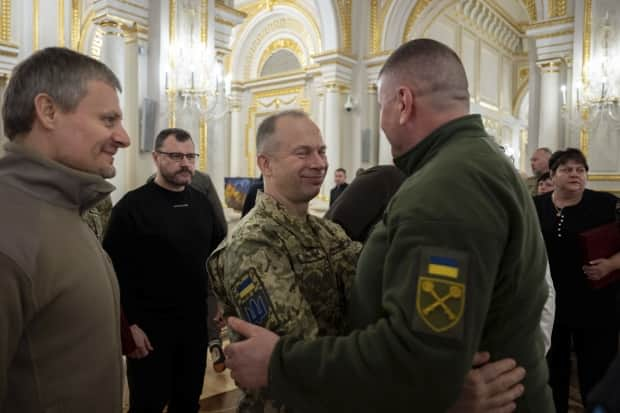
In a statement Friday, Syrski indicated he intends to take a tougher approach to the war and that his immediate goals are to improve the troop rotation at the front lines and harness the power of new technology.
Oleksandr Musiienko, the head of the Center for Military and Legal Studies in Kyiv, said the replacement of Zaluzhnyi won't lead to a loss of confidence in the Zelenskyy government within the army.
"Someone could be disappointed about this decision, but I think more soldiers are waiting for reforms in the army," Musiienko said. "In general, I think everything will be okay."
Musiienko said he and others are watching to see who gets appointed to the new top general's team, because that will shape the direction of the war more than the political debate in Ukraine — where polling shows Zaluzhnyi has become a more popular and trusted figure than the president.
Canadian support for Ukraine begins to slide
In Canada, meanwhile, the Angus Reid Institute released a survey this week that suggested Canadians' support for aiding Ukraine's war effort is weakening — especially among Conservatives.
Nearly a quarter of Canadians believe Canada is offering "too much support" to Ukraine in its fight against Russia, up from 13 per cent who were asked the same question in May 2022.
Among Canadians who voted for the Conservative Party in the last election, the percentage who say Canada is doing too much to assist Ukraine has more than doubled — from 19 per cent in May 2022 to 43 per cent now.
The Angus Reid findings mirror what's happening in U.S. politics. Recent Pew Center research found 48 per cent of Republican voters believe their country is giving "too much" aid to Ukraine.
WATCH: MPs vote to pass updated trade deal with Ukraine
Arel said there's still a very important distinction to be made between Canadian and American political opinion. While there's a significant Ukrainian diaspora population in the United States, it doesn't have the same political clout as the Ukrainian community in Canada.
Between half a dozen and a dozen ridings in Canada — mostly in Ontario and Western Canada — are competitive and have Ukrainian-Canadian constituencies that can make their political weight felt, Arel said.
"So, one would think [in a close election] that's a check to a Conservative Party of Canada going the way of the Republican Party on this geopolitical question," he said.
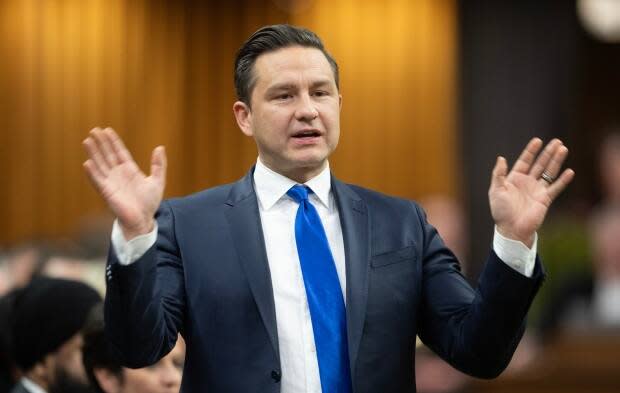
That might explain what The Globe and Mail referred to in an opinion piece this week as Conservative Leader Pierre Poilievre's "evasive bombast" when he was asked whether he agreed that Canada is providing too much aid to Ukraine.
It's not in Poilievre's interest to answer the question, especially given (as the Globe also noted) how Carlson, a self-professed admirer of Russia, has a devoted following among some Conservatives in Canada.
There's been lots of commentary on and dissection of Carlson's interview with Putin already. For Arel and other experts, however, one moment in particular stood out in the Russian president's long-winded history lesson.
"First of all," said Arel, "it wasn't an interview because Putin can't be contradicted." But what was really interesting for him, he said, was how Putin "came dangerously close to saying that Germany had the right — or at least cause — in invading Poland in 1939."
The remark, he said, left him thinking, "Wow, okay."
'One step beyond the Soviets'
Soviet history and propaganda was always very selective about its Nazi narratives. It often forgot, for example, that prior to the German invasion of 1941, Moscow and Berlin were allies who carved up an independent Poland.
"So [Putin] pretty much said that yesterday and that's going one step — one step — beyond the Soviets," Arel said. "Soviet propaganda would never go to that level."
Another expert — who perhaps also sensed the inflection point and was reacting to the shifting political discourse — released a report on Friday that underlined in the starkest of terms what a Russian victory in Ukraine would mean.
"The war in Ukraine is primarily a war for control of people, not land," wrote Karolina Hird of the Washington-based Institute for the Study of War.
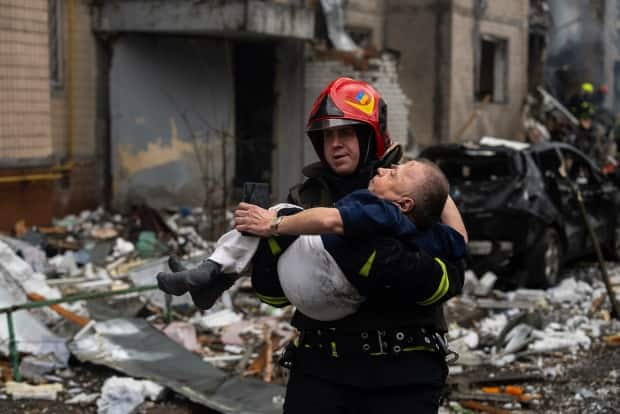
"Russian President Vladimir Putin has invaded Ukraine twice, not mainly because he desires Ukraine's land, but rather because he seeks to control its people. Putin's project, explicitly articulated in the 2021 article he published justifying the 2022 full-scale invasion, is the destruction of Ukraine's distinctive political, social, linguistic and religious identity."
In her report, The Kremlin's Occupation Playbook, Hird said that Putin "seeks to make real his false ideological conviction that Ukrainians are simply confused Russians with an invented identity, language and history that a small, Western-backed minority is seeking to impose on the majority of inhabitants."
Hird pointed down the road to an ending with a "hypothetical" Russian victory and offered a warning:
"The Russian war against Ukraine was always a war to eliminate Ukrainian nationhood and thus cannot end until Kyiv itself is made over into a Russian city and all Ukraine a Russian province."


